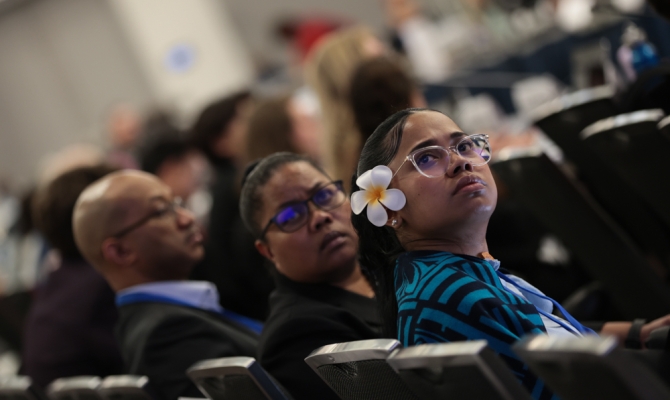As the clock ticks towards the final hours of the fourth session of the Intergovernmental Negotiating Committee to develop an international legally binding instrument on plastic pollution, including in the marine environment (INC-4) in Ottawa Canada, attention has turned to intersessional work required between the INC-4 and INC-5 in Korea, to support the further development of a plastics pollution treaty text.
During the main plenary on Sunday night, INC Chair Luis Vayas Valdivieso proposed the establishment of an ad hoc intersessional open-ended expert group to develop an analysis of potential resources and means that could be mobilised for implementation of the instrument.
He also proposed the establishment of a second ad hoc intersessional open-ended expert group to propose criteria on products, chemicals of concern, and related product design issues. Many delegations support the proposal.
Vanuatu, as Chair of Pacific Small Island Developing States (PSIDS), said: “We appreciate your great efforts in establishing a mandate on intersessional work, which will be clear to inform the INC process going forward. Your firm direction is received in good faith and encourages the spirit of cooperation and collaboration on key areas of convergence and divergence across the current iteration of the draft instrument.”
The PSIDS statement was delivered by Richardo Colmar, of Vanuatu.
“We have only seven months and eight full negotiation days left to agree to a treaty, which corresponds to the much-needed commitment and action to end plastic pollution. We agree with the modality proposed to have an expert working group on intersessional work that is open to all member states. We believe this should be open ended.”
The Pacific countries also supported the elements of intersessional work proposed by Rwanda and Peru to explore sustainable levels of production and consumption.
“We believe such a discussion is beneficial at this stage to continue our productive discussions on this critical issue in advance of INC-5.”
However, there is no consensus for intersessional work on sustainable production given a group of countries consider this topic controversial. The Pacific countries stand committed to engage on this topic and for it to remain in the draft agreement.
With time running out, on Sunday and Monday, delegates at the Shaw Centre rushed from subgroup to subgroup, addressing various provisions of the revised draft text.
At the outset, it was envisioned that the instrument would cover every stage of a plastic’s life cycle – the contribution of materials, products, substances, processes, and uses in the polymerisation stage; feedstocks; the sources and exacerbators behind pollution; plastics entering the ocean; and legacy plastics.
However, as the INC process continues, it has become quite obvious that views differ regarding the form, shape and the details of the treaty. At INC-3 in Nairobi, the goal was to agree on a first draft. This did not happen.
Delegates spent most of the meeting in contact groups, making changes to the text of an earlier draft of the treaty known as the zero draft. Negotiations broke down in the last days of the meeting, and delegates could not agree on essential details such as what constitutes the life cycle of plastic or on whether to put a cap on plastic production.
In Ottawa, a revised zero draft is the focus of long days and late night work for more than 2,000 delegates gathering here. They have been working to streamline the text, to advance negotiations so that the Committee can finalise, at its fifth session (INC-5) in November, the text of the instrument.
But time is running out, hence the Chair’s proposal for intersessional work.
The Alliance of Small Island States (AOSIS), of which Samoa is Chair, said the proposal from the INC Chair is very helpful.
“We agree that we need to do much, much more work if we are going to conclude this instrument by the end of INC5,” AOSIS intervened during Sunday’s plenary.
“We think that in many areas, we remain quite conceptually far apart. We see that in the negotiating rooms where we are arguing about different concepts through textual negotiations. We think that the intersessional proposal by the Chair can be helpful in bringing us closer to a meeting of the minds on exactly what we want this instrument to do.
“We do not think that the intersessional meeting should be a textual negotiation. The current text should inform our discussions, but we should not further negotiate the text in the intersessional meeting.”
On the specifics of the proposal, AOSIS believes the expert group on Means of Implementation (MOI) should cover all aspects of Part III, with a focus on analysing potential mechanisms and means for the implementation of the agreement, as well the elements that were highlighted for intersessional work in Contact Group 2.
“We are interested to hear from others on the scope of the second expert group. We want to make sure that the work is focused and be accomplished in the time that we have.”
INC-4 is the penultimate stage of the negotiations, following three rounds in Punta del Este November 2022, Paris June 2023, and Nairobi November 2023.
A decision on the intersessional work, amongst other key issues, will be made on Monday night.













